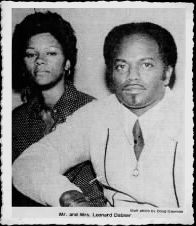
BLOCK 19
LOT : 243
ROW : 10
COLUMN : 12
SUB. R/C : ?
GRAVE # 6

|
Leonard John Dabner
b. December 31, 1945
Decatur, Macon County, Illinois
d. October 12, 2005
Decatur, Macon County, Illinois
buried: October 19, 2005

|

FATHER
Hensley Theodore Dabner
(1913-1948)

MOTHER
Margie M. Woodford
(1917-?)

MARRIED
Selena Jarrett
()
February 14, 1970
.
|

CHILDREN
with Selina
Eric Dabner
()
|
|

NOTE:
Leonard John Dabner,
fought in the
VIETNAM WAR
SP5 US ARMY
|
|

FATHER'S EXAMPLE HELPS BLACK MAN'S EFFORTS.
Leonard Dabner grew up in the shadow of a father he never knew. "My father died when I was about three years old, " says Dabner, who is a district representative for General Motors Acceptance Corp. "I can't remember anything of him." But Hensley Dabner Sr. left a strong image and an important accomplishment. "My father was one of the first blacks on Decatur's police force," says Dabner. And Hensley Dabner (who died of natural causes) also left behind a wife, two young sons, and his father Albert Dabner, who recounted for his grandsons early stories of 20th century Decatur. "My grandfather came to Decatur with his parents in 1900," says Leonard Dabner. "They came from Palmyra, Missouri, where they farmed." Before long, Albert Dabner was working in the foundry, one the few jobs open to blacks. "Decatur was a very prejudiced town then," says Leonard Dabner, recalling his grandfathers' stories. "As far as housing, jobs and pay it was pretty rough." So was the work in the foundry. "That was before all the modern equipment. My grandfather would tell us how hard the work was," Says Dabner. "But then he always did work hard." Albert married and raised a family. His son, Hensley, attended Millikin University. He played football and ran track. "He was about 6-1 or 6-2," says Dabner. "He weighed about 230 pounds. He was a good-sized man." Dabner theorizes that the contacts his father made at Millikin helped pave the way to the Police Department in 1943. But first there was a stint at a foundry where Hensley Dabner worked before joining the force. Once in uniform, his size helped combat the pressure a black policeman faced. "It was rough on him," says Dabner of his father's pioneering effort. "But from what I hear he handled it very well. He just did his job." Dabner pauses and checkles. "from what I hear, too, he cracked a hew heads." The example he left was clear to Leonard Dabner and his brother, Hensley Jr., who died in 1961. "He was something to look up to," says Dabner. "But I never had the desire to be a policeman." Instead, after graduation from high school, Dabner went into the factory work. /he worked at A.E. Staley Mfg. Co. until drafted for military service in the Vietnam War. After his discharge he returned to Staley, then moved to Caterpillar Tractor Co., sold insurance and worked at Mueller Co. before taking his current job five years ago. "I worked about everywhere," he laughs, perhaps recalling his grandfather's stories, "except the foundries." And though he has made it to a white-collar job, he believes the path for young blacks still has many obstacles. "There is factory work," he says. "But the white-collar jobs are limited. That's probably one reason so many young blacks leave. "Decatur is a very conservative town." Dabner can remember bumping up against that prejudice from his earliest school days. "The schools I attended were always predominantly white," he says. "You always had to contend with the name-calling and you had some battles to fight every now and then." But he stayed with it. "Yes, you do become bitter," he admits of a black's reaction to lifetime of experiencing prejudice. "But you don't want to let it force you back into a corner. You want to try and better yourself." "if you better yourself, you're not only helping yourself but making it better for your race." The revelation of that struggle is the prime benefit he sees developing from the televisioin presentations of "Roots" and "Roots: The next Generations." "It has brought to light a lot of things that went on," he says. "That's good, especially for white people to see it. A lot of them think things were never really that bad. "But history speaks for itself." Like the ancestors of Alex Haley, who stuck with the town of Henning, Tenn., despite all they had to contend with there, Dabner finds himself attached to his hometown, warts and all. "You just kind of become complacent with it," he says of why he stays in Decatur. "It's home."
The Decatur Herald - (Decatur, Illinois)
22 FEB 1979 * page 32 |

The Herald & Review
(Decatur, Illinois)
18 OCT 2005 * page 21
|
|
| |